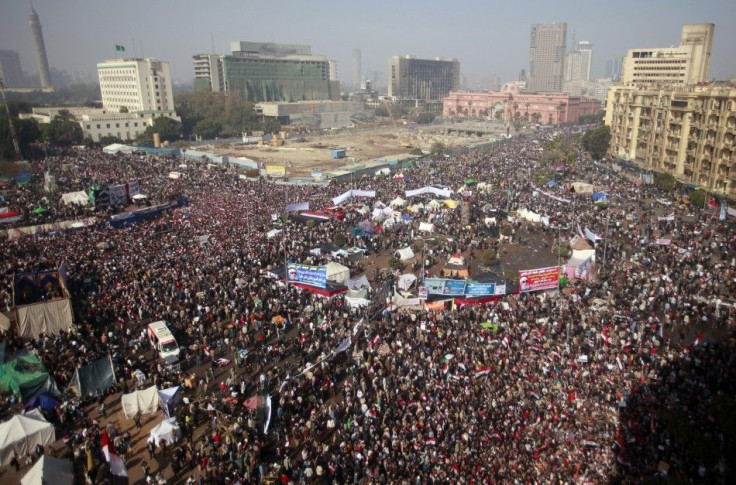Egypt Revolution Anniversary: Jan. 25 Brings Frustration and Reflection

In 2011, the events of January 25 sparked events that would change the history of Egypt, and the date itself became a rallying cry for the bloggers, social media users and activists at the heart of the revolution. Exactly one year later, thousands of Egyptian protestors have again gathered in Cairo's Tahrir Square, some in reflection but most in defiance.
The original Tahrir protests led the to the resignation on President Hosni Mubarak on Feb. 16 and brought to an end his oppressive 30-year rule. In his place, a military tribunal called the Supreme Council for the Armed Forces (SCAF) took control of the country for what was supposed to be a short transitional period between the old regime and a new democratic government.
But the SCAF has proved itself to be nearly as brutal as Mubarak, and protests in the past year have repeatedly been met with force, leading to hundreds of deaths. The Coptic Christians were shot at and run over by army vehicles, protesters were beaten to death and the SCAF has delayed both elections and the trial of Mubarak and his top cohorts.
That is why, a year after a day that was described as the edge of something truly momentous, 5,000 demonstrators gathered in Cairo to do their best to assure that their efforts and some of their lives were not wasted for a military coup, but for the people.
A year later, with 19 more repressive dictators in power, we are still demanding the downfall of the regime represented in the Supreme Council for the Armed Forces, wrote blogger Gigi Ibrahim on Wednesday.
Tahrir [is] as packed as I've ever seen it, noted English journalist John Rees, who was in Cairo on Wednesday.
There have been some major steps taken in the last year, as well as in the last few days. A parliament that was elected in Egypt's first free vote this fall was sworn in on Monday and began creating a constitutional committee, a necessary step if the SCAF is ever to step down.
[Egyptians] have discovered and used freedom of expression in a way that, not so long ago, would have been deemed unthinkable, Mohamed El-Erian, the Egyptian-American CEO of PIMCO, said of the elections.
For the first time in decades, millions of Egyptians now feel that they 'own' their country, and that they are directly responsible for its well-being, and for that of future generations.
On Tuesday, the military council's head Field Marshal Mohamed Hussein Tantawi lifted a 30-year-long state of emergency that gave police and security forces extraordinary privileges. However, in a sign of the SCAF's heavy handedness, Tantawi kept the state of emergency in place for anyone deemed a thug, the undefined term used to crack down on protestors. In the past 12 months, activists, bloggers and youths have been detained and beaten because they were deemed to be thugs.
Additionally, the elections were tough for secular Egyptians, whom Council on Foreign Relations Senior Fellow Ed Husain said lost the revolution they helped trigger. Egypt's moderate Islamist party, the Muslim Brotherhood, unexpectedly took the majority of seats in the new parliament, but the right-wing and devoutly Muslim Salafist party came in with a strong second place showing.
Newspapers and blogs around the world are asking on Wednesday if Egypt is about start its second revolution. But for those who have stayed in Tahrir in body and spirit for the past 365 days the first revolution never ended.
© Copyright IBTimes 2024. All rights reserved.





















